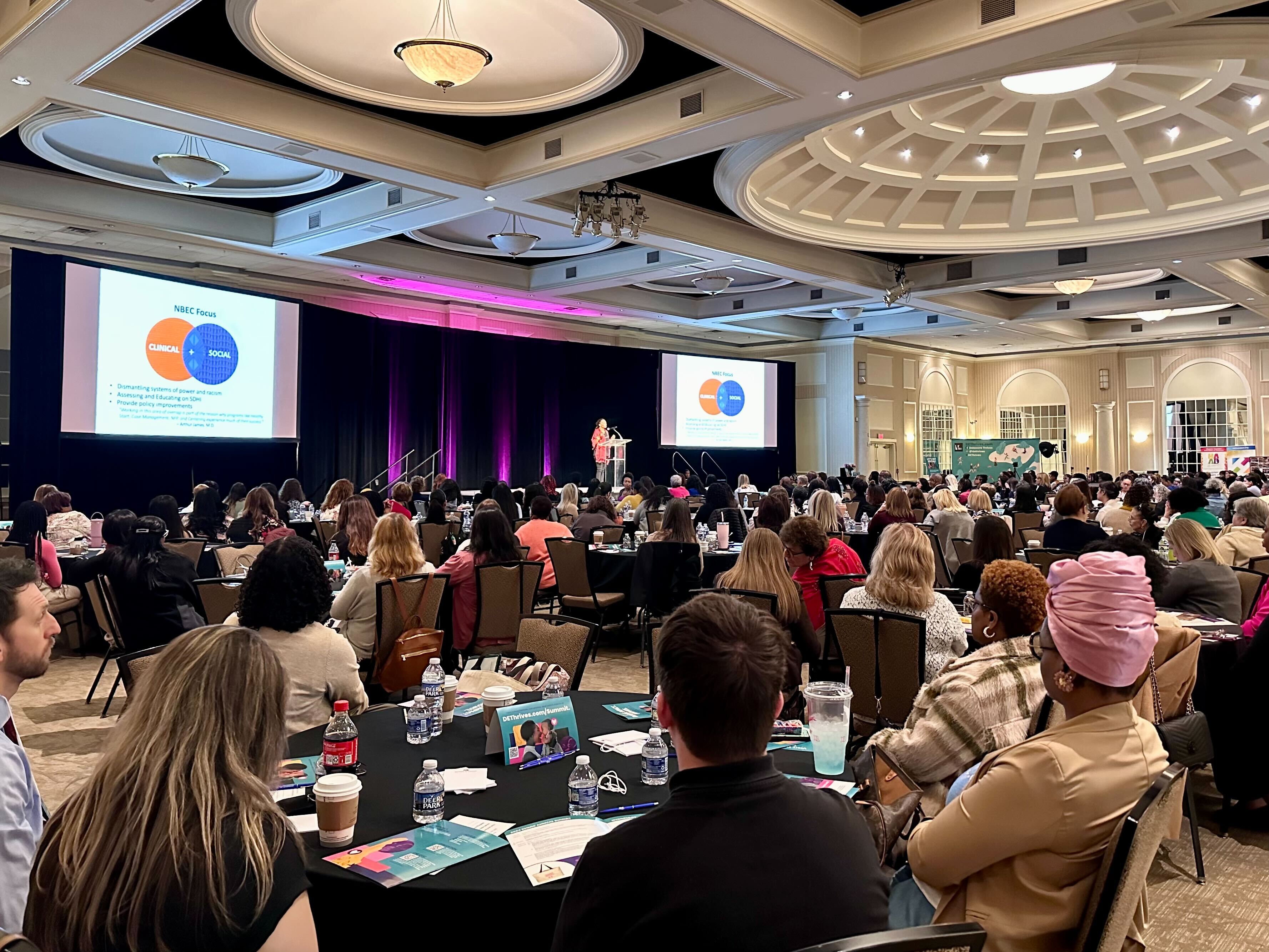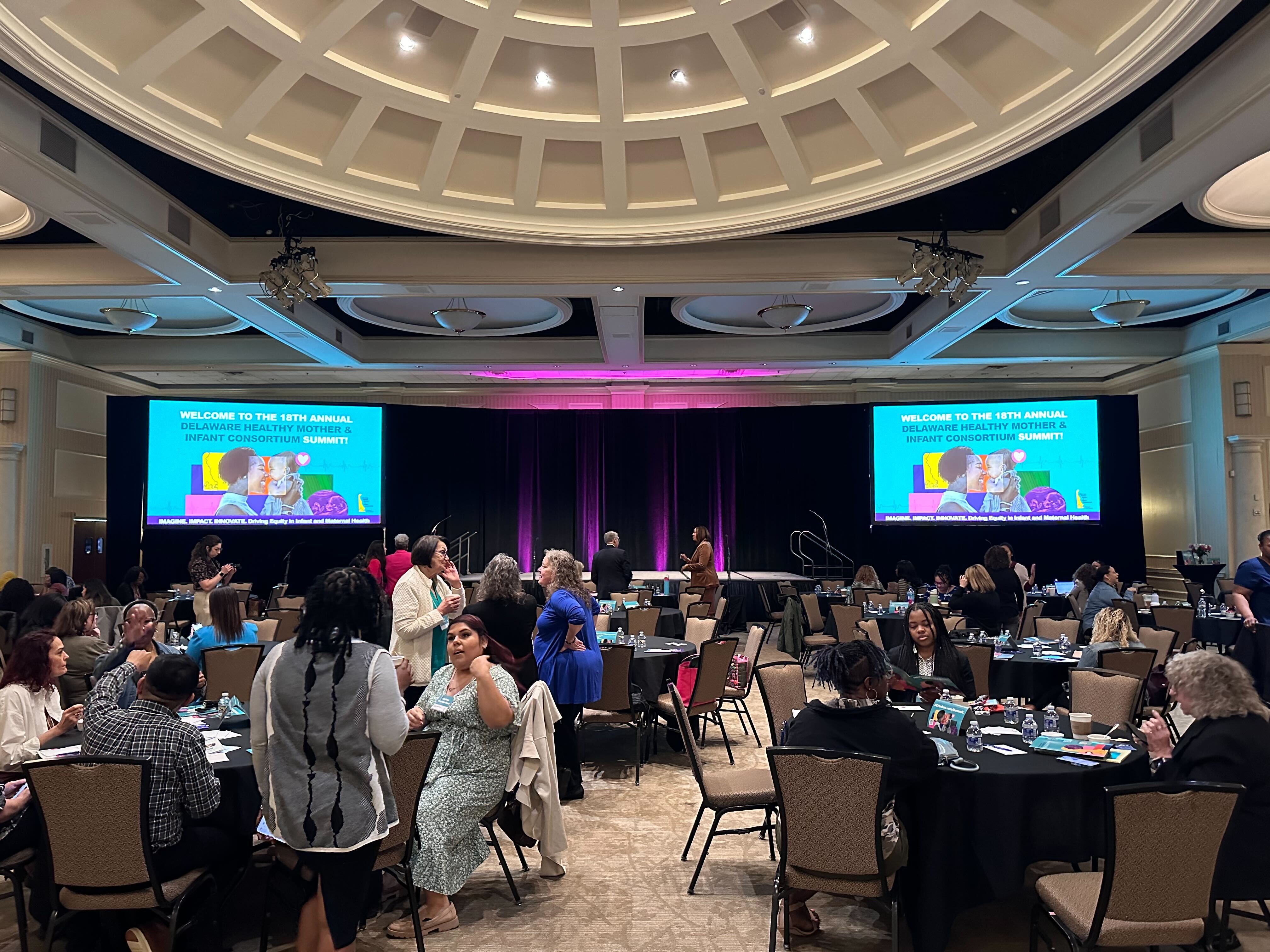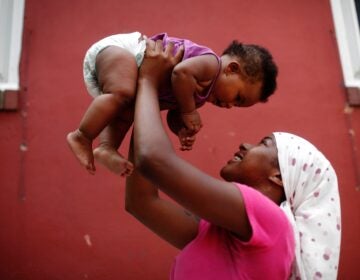Delaware faces persistent health disparities, particularly for Black maternal health
Health disparities for Black maternity remain a challenge in Delaware. Advocates say the problem stems from systemic racism, implicit bias and injustice.
Listen 1:32
Pediatrician and chair of the Delaware Healthy Mother and Infant Consortium, Priscilla Mpasi, kicked off the dialogue at the 18th annual DHMIC summit in Wilmington, Delaware. (Johnny Perez-Gonzalez/WHYY News)
From Philly and the Pa. suburbs to South Jersey and Delaware, what would you like WHYY News to cover? Let us know!
Despite improved access to health care in recent years, Delaware continues to face troubling disparities in health outcomes among different racial and ethnic groups, with particular challenges in Black maternal health and infant mortality rates.
As Black Maternal Health Week wraps up, advocates are hoping to draw attention to those disparities. The Delaware Healthy Mother and Infant Consortium gathered a group in Wilmington this week to address critical issues affecting mothers and babies before, during and after pregnancy, as well as throughout the child’s life.

Priscilla Mpasi, DHMIC chair and pediatrician, noted at this week’s 18th annual summit that despite an overall reduction in infant mortality in the state, rates are still high for certain groups.
“Delaware has really made strides in infant mortality first… What’s really critical is that when looking at deaths by race or ethnicity, we’re still seeing disparities where there are higher deaths among non-Hispanic Black infants and Hispanic infants,” she said. “For Black infants were still seeing at a rate as high as 11 [deaths] per 1,000 births, and then also, for Hispanic [infants], about 8 [deaths in 1,000 births].”
In Delaware, a comprehensive review of maternal-child health cases from 2017 to 2021 revealed significant disparities. Despite accounting for 28% of live births, Black women in Delaware represented 78% of pregnancy-related deaths, mirroring national trends. Statewide, from 2015 to 2020, Delaware saw a 40% decrease in its infant mortality rate, with deaths per 1,000 live births falling from 9.0 to 5.4.
The leading contributor to infant mortality in Delaware is premature births. In 2021, the premature death rate was 11%, and by 2022, it had declined to nearly 10.8%, nearing the national average.
Systemic racism, implicit bias and injustice serve as primary causes of the ongoing disparities observed across ethnic groups, advocates say.
“We are in a country that’s had centuries of racism, and that racism has led to structural and system inequities. We talk about redlining where there’s actually policies and legislation that are barriers for people to have equitable access,” Mpasi explained. “Regardless of what that barrier is, it’s going to impact care, whether it’s maternal health, whether it’s infant health, whether it’s heart disease, cancer and so forth.”
Other factors play a role, too. Things like the “environmental factor, the social determinants of health factors, communities where people live,” she added.
The social determinants of health impact both Black maternal health rates and the general public. For instance, a recent study found social conditions influencing health outcomes for residents in Wilmington and Dover, where poverty rates are 24% and 20%, respectively.
Economic instability and neighborhood environments pose challenges to healthy habits for mothers and those who are pregnant, especially given the prevalence of food deserts in these regions. Health outcomes in areas like Wilmington and other parts of Delaware are closely linked to fresh food availability.
Mpasi emphasized that while Wilmington, the state’s largest city, requires support, attention must also be given to other areas in the southern part of Delaware. She highlighted troubling trends in Kent County, where Black infant mortality has risen by about 80%, Hispanic infant mortality has risen by 16% and white infant mortality has decreased by 43%.

Many women of color, like Mpasi, face challenges in accessing the care they need, particularly when they feel unheard and misunderstood regarding their symptoms and body experiences.
Professionals may perceive their needs differently based on race, adding to these barriers.
“I’ve had that experience myself, trying to seek care and not being heard in terms of listening to my symptoms, and it wasn’t until I mentioned that I was a physician that I saw the care being altered,” she said. “That’s why, again, we can fix some social determinants of health, but that’s where the training part comes in. We have to train our health professionals, our communities.”
Erica Allen is working to address these disparities in her unique way. The mother of four is a licensed practical nurse who serves as the executive director of the Do Care Doulas Foundation. She also had an experience of not being heard by health professionals, which later led to a traumatic event.
During her recent pregnancy, Allen realized that her blood pressure was not normal. Despite seeking treatment, she said she was neglected by her health care providers, which led to the development of pre-eclampsia.
“I noticed that my blood pressure was trending on the higher side, I spoke up… I was told everything was okay. Weeks passed [and] they actually had scheduled me for 38 weeks to be induced,” she said. “I didn’t even make it to 38 weeks, by that time I ended up having pre-eclampsia, which I was alluding to and going to the hospital to let them know, ‘Hey, like, this is where it’s headed,’ and I was not heard.”
After being induced due to pre-eclampsia, Allen had a traumatic delivery experience and hemorrhage. Inspired by her own story and the experiences of many others, she decided to open her own organization to help mothers like her find doulas who can advocate for them before, during and after birth.
As part of Black Maternal Health Week, Allen and her team are hosting their third annual Black Birth Expo to support the community of mothers this weekend in Wilmington. The event will provide resources and distribute essential mother and child supplies, including diapers, wipes, strollers and other items, to those in need.
“My expectation is to bring people together, all birthing people, but also make sure that we highlight Black maternal disparities and make sure we love on Black birthing people and let them know that they are important and that this event is an honor for them,” Allen said. “I’ve seen some mothers come through. They might have the same due date and they connect and they have a due date buddy, or they’ll connect with one of our doulas.”
Delaware lawmakers officially recognized the effort this week with the passage of a resolution officially recognizing the week as Black Maternal Health Awareness Week in the state.

Get daily updates from WHYY News!
WHYY is your source for fact-based, in-depth journalism and information. As a nonprofit organization, we rely on financial support from readers like you. Please give today.







